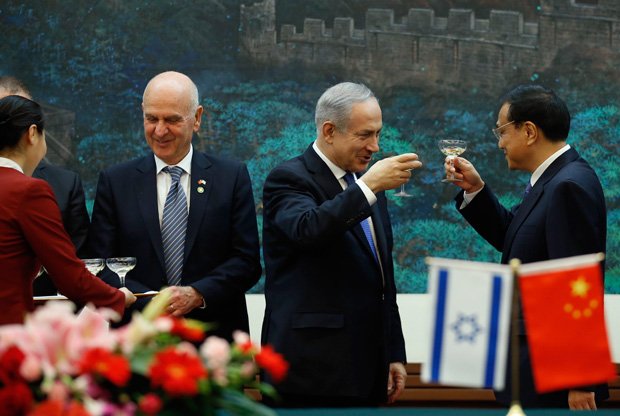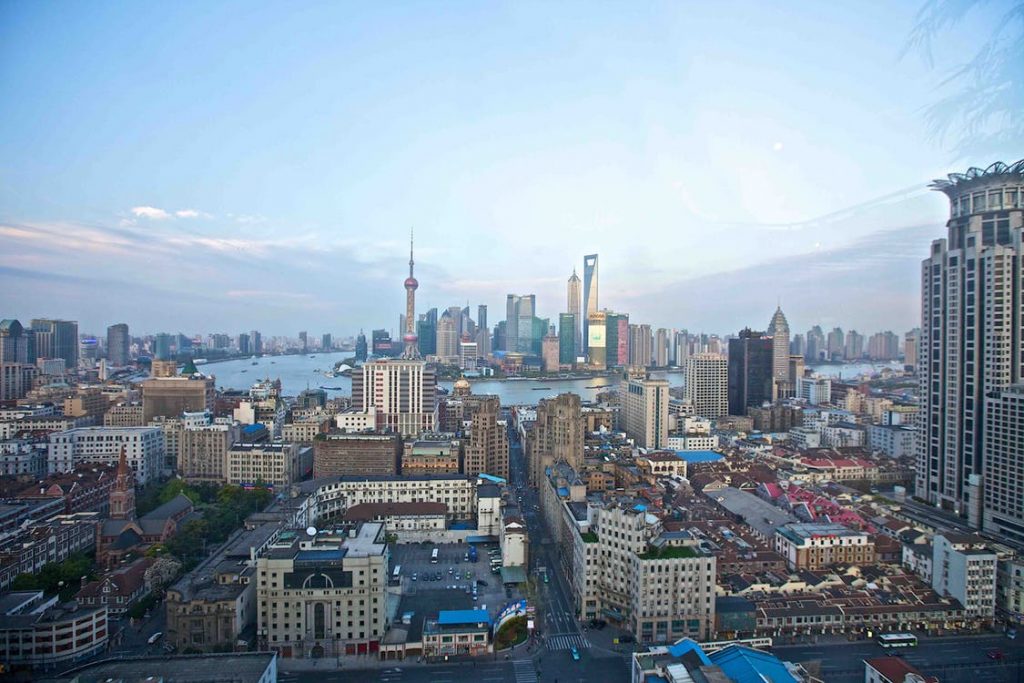China is honoring Israel with an “Israel Culture Week” from November 11 to the 15th to celebrate 25 years of diplomatic relations between the two countries which have reached new heights recently. The event is part of the 19th China Shanghai International Arts Festival to which some of Israel’s finest artists, including renowned violinist Itzhak Perlman, have been invited to showcase performances, hold workshops and classes and present Israeli culture and traditions through art.
Bilateral ties between the two countries have increased significantly in recent years, with the launching of the Israel-China Innovation Committee and the Israel-China Economic Task Force, and mutual trade which was estimated at $50 million in 1992 reaching over $11 billion, according to figures made available by the Israeli Foreign Ministry.
Cultural cooperation and foreign investment have also been on the up as of late. While the US and Europe have traditionally been the dominant investors in Israel, Chinese investment in Israel jumped to a record $16.5 billion last year, according to a Reuters report this May, with significant funds being invested in startups focused on cybersecurity, medical devices and artificial intelligence. According to the report, Chinese entrepreneurs looking to invest in Israeli technology have found a “warm welcome for their cash.”
China has also been seeking Israeli talent and know-how, with at least seven Chinese multinational corporations opening up R&D or innovation centers in Israel over the past three years according to a recent report by Start-up Nation Central, including electronics giant Haier and Huawei, which also bought Israeli startup Hexatier for a reported $42 million last year.
SEE ALSO: With Strong Tech Ties, Is Israel China’s New Best Friend?
In June 2017, NoCamels reported that a new Chinese venture capital fund called MizMaa Ventures ( a combination of the Hebrew words for east and west) would be investing $100 million in Israeli startups like shopping search engine Twiggle, cybesecurity companies Armeron and Coronet, and mobile technologies company Corephotonics. China also struck a $300 million deal in September 2017 to partner with Israeli vegan tech companies like SuperMeat and Future Meat Technologies that create lab-grown meat in order to cut down on greenhouse gasses and pollution.

Netanyahu in China via Kathy and Charley Wood on Flickr
Last week, 15 Israeli Information and Communications Technology (ICT) and Life Science companies were selected to present their technologies to Chinese investors at the annual Israeli roadshow in China, an event organized by the Israel Innovation Authority in cooperation with the Chinese Ministry of Science and Technology. The companies were selected by a Chinese investors’ delegation in a preliminary pitching event in Israel in July 2017. During the roadshow, Israeli companies visited Chinese cities Shanghai, Changzhou and Beijing to hold B2B meetings, present their products and technologies to investors from companies like Fuson, PingAnVentures and San Power and participate in more pitching event competitions.
“This was an impressive turnout by a pertinent Chinese audience,” said Avi Luton, Senior Director of the Asia Pacific Department in the Israel Innovation Authority, in a statement this week. “They were highly impressed by the Israeli startups’ presentations and showed enormous interest by asking numerous questions, proving again what great interest the Chinese market has in the achievements of Israeli innovation.”
Luton also said the roadshow really emphasized the considerable potential Israeli companies have in the market.
Chinese-Israeli acceleration
Chinese investors have tuned into Israel’s considerable potential by creating platforms and opportunities for R&D cooperation and investment. In October, Israel’s Ministry of Economy and Industry set up a China-Israel accelerator program in Beijing with Chinese partner ShengJing group. The program aims to help Israeli tech companies enter the Chinese market by providing expertise, resources, and funds to five carefully selected Israeli firms that will join the inaugural program in December for a period of six months. The program includes training in the Chinese ecosystem, business development, mentorship, meetings with potential customers and investors, as well as roadshow trips to innovation areas of China including Shanghai and Guangzhou.
Dovi Ollech, Founder and Managing Partner of Emerge, a Tel Aviv-based early stage venture capital fund with strong ties to China, says that Israel and China are always looking for ways to complement each other.
“The accelerator program is a great launching platform for Israelis who want to break into the Chinese market” he tells NoCamels, “It’s all about getting access to the right people.”
While Chinese investors are trying to encourage an influx of Israeli tech companies and innovation with programs to welcome them into the country, Ollech says Israeli entrepreneurs often run into problems when trying to break into the Chinese market. The United States, he explains, is more of a natural route for Israelis, because they already know the language and have grown up with a sense of Western culture, while China represents a different world. While China represents an incredible opportunity for Israeli startups, Ollech thinks that Israelis need the right strategic partners that understand China if they want to succeed in the country. This idea has pushed him to help create Emerge to help early stage Israeli startups find opportunities in China.
“I think most Israelis can’t ignore what is happening there,” he says.
Startup East, an accelerator program focusing on Asian markets, has its own programs designed to help Israeli startups break into their target markets in China. These offer access to Chinese and Israeli advisers who understand the markets, as well as translators, distributors, and experts in finance and law. Co-founder and co-CEO Amos Avner says 10 Israeli startups have already visited their partners SITI-Sino Israel Technology Innovations, a Chinese-Israeli cooperation system platform, in the Chinese city of Qingdao. They have also been to Vspace, the new Startup East incubator in Beijing, to explore business opportunities.
“If you compare China to other countries in Asia, you can say that there is a huge hunger in China to invest in Israel,” he tells NoCamels.
Sign up for our free weekly newsletter
SubscribeAlibaba establishing R&D center in Israel
Avner says Israel provides tech solutions that cater to improving the business-to-business experience.
“The best companies that go to China are the mature verticals with financial stability in B2B, because the consumer-driven companies don’t have as good of a chance,” he says. He explains that it takes too long to tap into the Chinese market, particularly because it already has its own e-commerce giants like Alibaba and Baidu.
But these giants do recognize Israel’s technological edge, and in 2015 Alibaba invested an undisclosed amount in Visualead, the Israeli startup that creates “designer” QR codes. It also invested $15 million in Israeli Augmented Reality (AR) startups like Infinity AR and Lumus, cybersecurity startup ThetaRay and e-commerce search company Twiggle.

Alibaba via Ayala on Pixabay
Showing a desire to go global, at Alibaba’s Computing Conference in China last month, CTO Jeff Zhang revealed a $15 billion global research program called DAMO – Academy of Discovery, Adventure, Momentum and Outlook, which includes opening seven R&D centers worldwide over the next three years in areas like Moscow, Singapore, and Tel Aviv.
“This is a big opportunity for Israel,” says Avner and affirms the significance of increased Chinese investment in Israel.
The future of Chinese-Israeli cooperation
Not limiting itself to Israeli tech, China has also tapped into Israeli higher education by establishing partnerships with top Israeli universities that cater to the future of innovation in the Middle East. Through a $300 million partnership between Tsinghua University and Tel Aviv University, a landmark joint research hub and innovation center was established at TAU in 2014. This year, Zong Qinghou, the CEO of one of China’s largest beverage company, Hangzhou Wahaha Group, announced he was setting up a research center focusing on Artificial Intelligence at the University of Haifa. Zong will provide the AI center with at least $10 million over the next five years.
Israeli politicians are well aware of the importance of close ties with the Asian giant. Prime Minister Benjamin Netanyahu and Israeli Economicy Minister Eli Cohen, as well as other Knesset members, visited Beijing in March to mark the 25th anniversary of Sino-Israel ties, where they attended the third annual joint Israel-China innovation conference. There they signed a number of cooperation agreements including in the areas of aviation, education, science and health.
Cohen praised the importance of the Chinese-Israeli relationship in September in an interview with the Chinese news agency Xinhua. “We are willing to see more Chinese companies operating in Israel and in the next 30 years we will see more tremendous technological change, and we are willing to increase the cooperation between China and Israel,” Cohen said.
At the same time, China and Israel were signing a $300 million trade agreement meant to boost the export of eco-friendly energy and agricultural technologies from Israel. China has become Israel’s largest trade partner in Asia and Israel’s third largest global partner.
“Why does China need Israel? There are areas in China that don’t have the capabilities that the US has. They still want to compete on a global level and they know they need the best tech. Israel has the best tech,” says Ollech, who believes we are only seeing the beginning of Chinese interest in the Startup Nation and that it will be “much bigger in the next decade.”
Avner, on the other hand, thinks the two countries will take a little longer to become true partners, perhaps even 20 or 30 years. Still, he warmly echoes Ollech’s sentiments.
“Almost every VC has some Chinese money or is looking to raise funds from China. China is not really the future, it’s the present,” he explains.
Photo: Kathy and Charley Wood, Ayala
Related posts

Editors’ & Readers’ Choice: 10 Favorite NoCamels Articles

Forward Facing: What Does The Future Hold For Israeli High-Tech?

Impact Innovation: Israeli Startups That Could Shape Our Future




Facebook comments